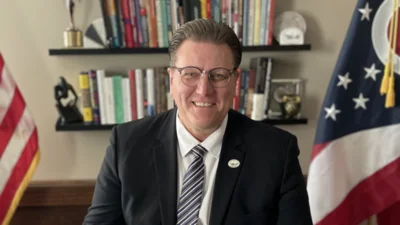In the race to fill the shoes of Knox County Sheriff David Shaffer, three candidates vying for the position are taking markedly different stances on how to tackle the persistent issue of the drug epidemic in the community.
At a Q&A session held at the Woodward Opera House on Feb. 20, Danville Police Chief Daniel Weckesser advocated for a robust, enforcement-centric approach. He emphasized the importance of targeting drug dealers aggressively and providing law enforcement with the necessary support to apprehend them effectively.
“Our drug problem is a huge problem, and I believe that we need a relentless approach to removing the drugs on the street," he said. “We need to go after the dealers. Law enforcement needs to have an administrator in charge that will back the officers for whatever they're going to do and we need to go get the main dealers off the street. We have a lot of great officers in our county and deputies, and we need to just be cut loose so that we can go do our job and get these individuals off the street and locked up where they belong."
Additionally, Weckesser proposed seeking increased funding for mental health initiatives, including sponsorships for individuals struggling with substance abuse and diverting those with mental health issues to specialized facilities like the psych ward in Mansfield.
In contrast, Deputy Reserve Unit Captain William Shaffer, currently serving as the Captain and Jail Administrator at the Knox County Sheriff’s Office, outlined a community-focused strategy.
Shaffer highlighted ongoing efforts such as the Medication-Assisted Treatment (MAT) program at the county jail, aimed at providing medical support to wean addicts off drugs. He proposed expanding these initiatives to the community.
“We've started a MAT program at the jail, which is, medically assisted treatment, for drug addiction,” Shaffer said.
“What that does is that allows those folks to go through a physical, they go through a psych evaluation, they go through the process. They are then able to receive an injection which cuts off those receptors. It cuts the craving. So when the folks leave the jail, they can go to treatment, they can go to their job interviews, they can go back home without having to worry about that type of stuff. What I want to do is expand that, expand it into the community.”
Meanwhile, Wayne Noggle, a former Knox County deputy who currently works as sales manager at Holmes Rental and Sales, emphasized the importance of deeper intervention and early intervention programs.
“With drugs comes the mental health issues. The programs that are in place now. They've been helping people,” Noggle said. “But I think we need to dig deeper when it comes to drugs. It is my opinion, like anything else, that if you don't realize you have a problem, you don't want to fix your problem. So we got to work more at putting funds and stuff towards finding them avenues to help people understand they have an issue with drugs.”
Noggle stressed the need to allocate funds towards initiatives aimed at raising awareness and called for innovative approaches and collaboration with community partners to develop and implement new programs tailored to the evolving needs of the community.
The debate over strategy comes as a drug epidemic has been sweeping the nation and fentanyl overdoses have become the primary cause of death among young Americans aged 18-45.
“The addictive drug is responsible for nearly 70% of the United States' 107,000+ drug overdose deaths in the past year and is 50 times stronger than heroin and 100 times stronger than morphine,” the Drug Enforcement Agency said of fentanyl on its Get Smart About Drugs website.
The Centers for Disease Control’s latest data shows in 2021 Ohio had the 7th highest incidence of drug overdose deaths.
Ohio also had the fifth most overdose deaths nationwide with 5,397.
In response to the escalating fentanyl crisis, Knox Substance Abuse Action Team, in collaboration with RecoveryOhio and Ohio state departments, has been spearheading an initiative to install emergency naloxone access cabinets on independent college campuses statewide, including those in Knox County.
With the tragic loss of two Ohio State University students to fentanyl overdoses in 2022 and the prevalence of fake Adderall pills laced with fentanyl, universities are taking proactive measures, including distributing complimentary fentanyl test strips.






